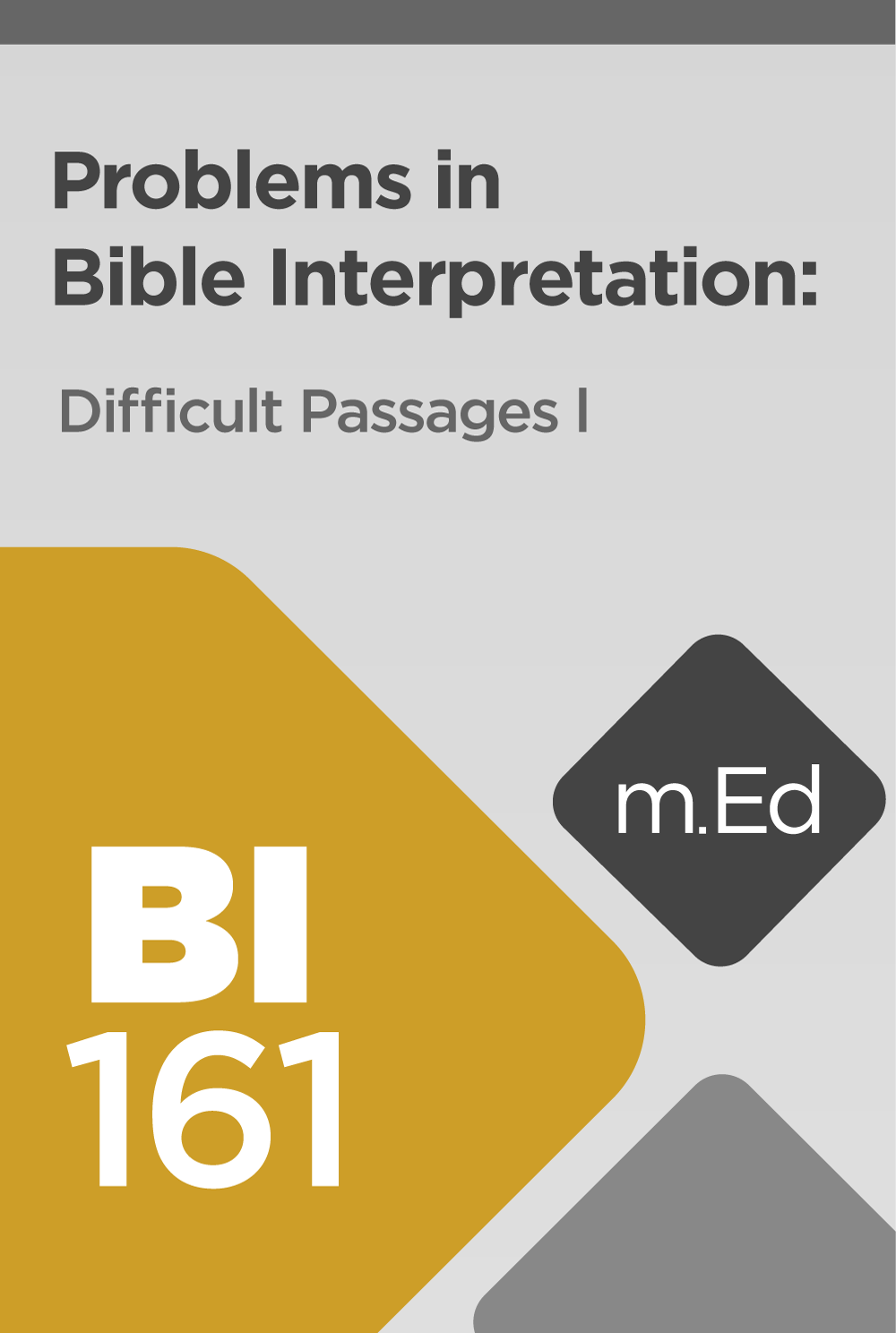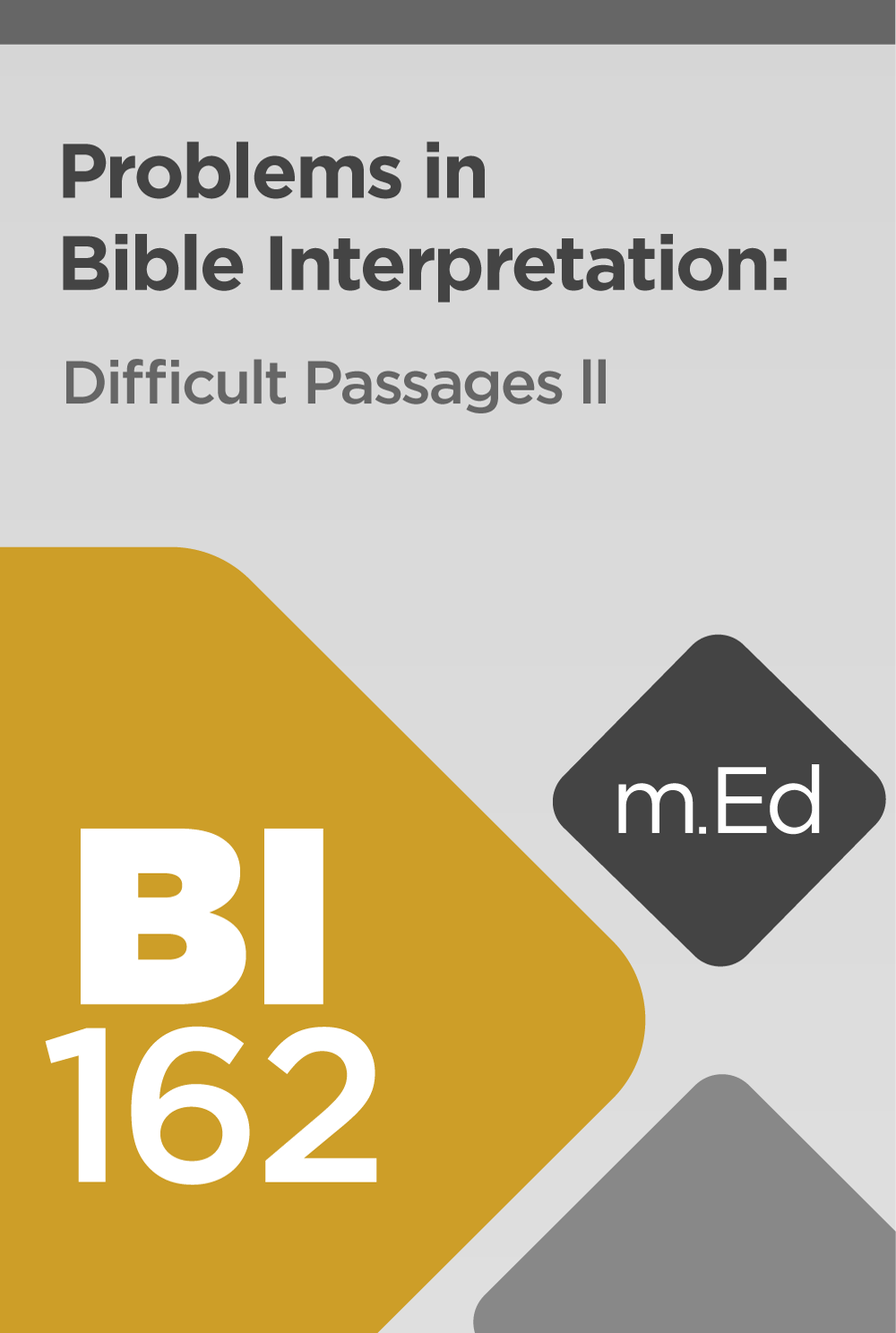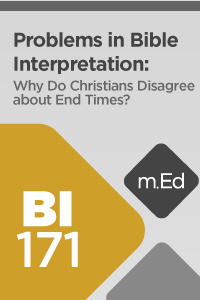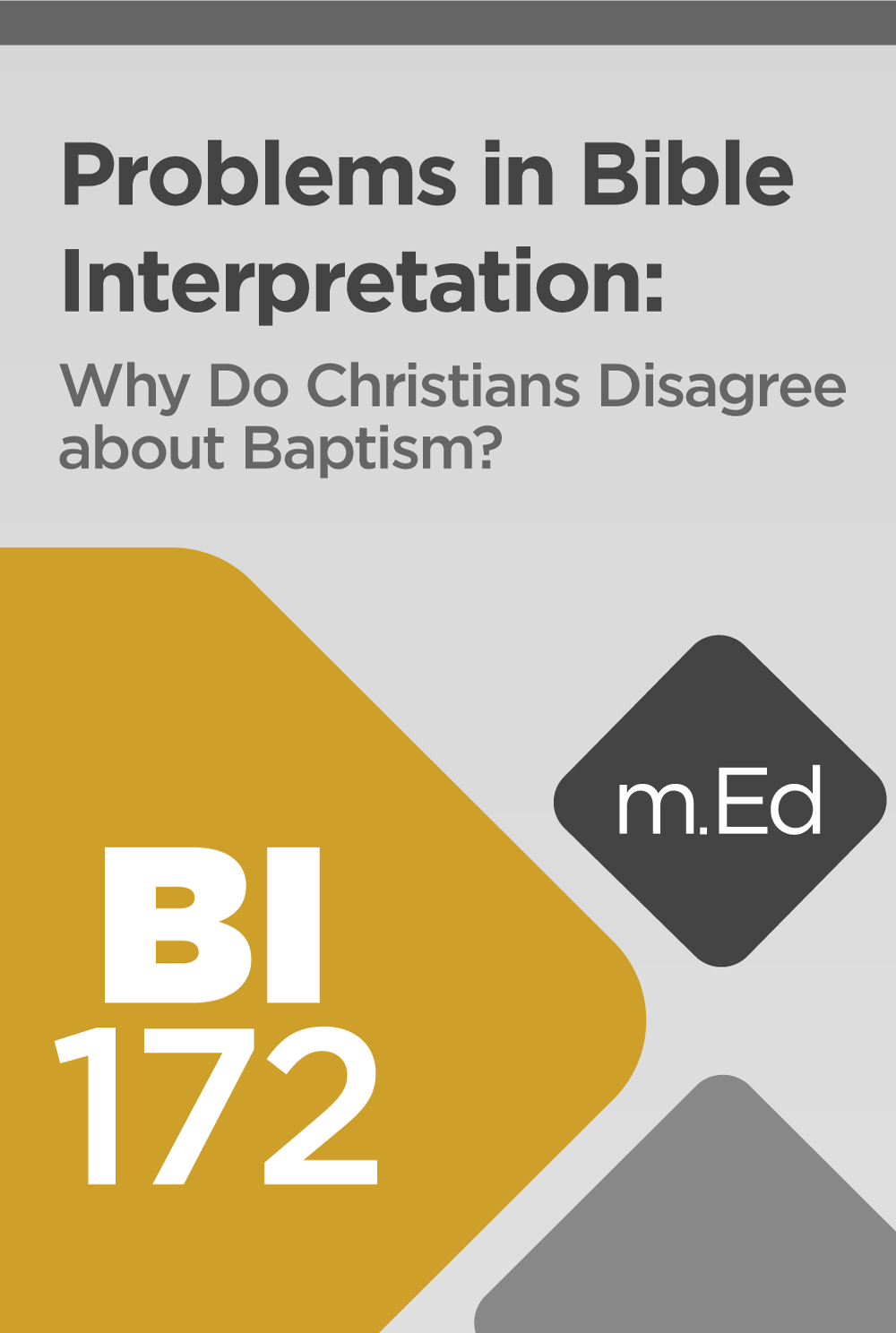Mobile Ed: Michael Heiser Problems in Bible Interpretation Bundle (8 courses)
Digital Logos Edition
Overview
Join Dr. Mike Heiser as he explores difficult passages and topics in this comprehensive bundle. In his BI170 series Dr. Heiser walks through the different positions on controversial topics like baptism, inspiration, inerrancy, and the end times, focusing on the importance of being able to understand various points of view and understand why you believe what you believe. In his BI160 series he examines difficult passages of scripture, introducing the key interpretive issues and providing principles for understanding these passages that can be applied throughout your study of the Bible. The Michael Heiser Problems in Bible Interpretation Bundle will help you study and understand God’s Word more deeply.
This title is included in the following collections
You can save when you purchase this product as part of a collection.
Mobile Ed: Michael Heiser Mast...
$1,799.99$1,799.99Mobile Ed: Master Collection (...
$31,999.99$31,999.99

- Title: Michael Heiser Problems in Bible Interpretation Bundle
- Instructor: Michael S. Heiser
- Publisher: Lexham Press
- Product Type: Logos Mobile Education
- Resource Type: Courseware, including transcripts, audio, and video resources
- Courses: 8
- Video Hours: 23.5

Believe it or not, not everything in the Bible can be understood by children; many passages are not even easy to understand for adults. Delve into a number of difficult passages with Dr. Heiser as he introduces key interpretive issues and the problems that are lurking in the background of these verses. He guides you through what needs the most attention and introduces you to several options for interpretation for each passage. Dr. Heiser focuses on the importance of being able to wrap our minds around and navigate through the difficult passages of Scripture, because although they may be challenging, they are still significant for theology. How you understand these verses will have an important ripple effect on the interpretation of other passages you will encounter in the course of your own personal Bible study.
Contents:
Unit 1: Genesis 1:1-3
- Why Worth Discussing?
- Types of Clauses?
- Clause Functions
- Introducing Gen 1:1–3
- Traditional View of Clauses and a Hidden Factor, Alternate View
- Importance and Ramifications
Unit 2: 1 Samuel 13:1
- Why Worth Discussing? The Problems Introduced
- Problems #1 and #2 Discussed
- Resolution
Unit 3: Exodus 4:21-26
- Why Worth Discussing?
- The Context and Why the Confusion?
- Bridegroom of Blood Phrase
Unit 4: Genesis 9:20-25
- Why Worth Discussing?
- Historical Explanations
- Maternal Incest
Unit 5: Deuteronomy 32:8-9
- Why Worth Discussing?
- The Issue: Out of Date Translations
- The Meaning
Unit 6: John 1:1-2
- Why John 1:1–2 Is Worth Discussing
- Explaining the Issue
- GONG
- Summary of What We Found
Unit 7: Acts 2:42-46
- Why Worth Discussing?
- Modern Perspective
- Immediate Context
- Wider Context
Unit 8: 1 Peter 3:14-22
- Why Worth Discussing?
- The Passage and Its Difficulties
- Explanation
- 1 Enoch, Enoch, and Typology
- Baptism Element
Unit 9: 1 Corinthians 15:29
- Why Worth Discussing?
- Focus of Interpretation
- Select Proposed Interpretations
Unit 10: Romans 6:1-14
- Why Worth Discussing?
- Analysis
- Practical Note
- Conclusion

In Problems in Bible Interpretation: Difficult Passages II (BI162), Dr. Michael Heiser discusses several challenging Scripture passages. He covers some passages that pose ethical problems like God telling Samuel to lie, David asking God to kill his enemies, and Jesus telling His disciples to buy swords or to eat His flesh and drink His blood. He also examines several places where New Testament authors use Old Testament passages.
Contents:
Introduction
- Introducing the Speaker and the Course
Unit 1: 1 Samuel 16:1–5
- God and Samuel
- The Problem with 1 Samuel 16:1–5
- What Is a Lie?
- Context of the Ninth Commandment
- Acceptable Uses of Deception
- Contemporary Application of Ninth Commandment
Unit 2: Ezekiel 1
- Ezekiel 1: Capturing the Imagination
- Ezekiel’s Vision of God’s Throne
- Elements of Ezekiel 1 and Their Context
- Meaning of Ezekiel 1
Unit 3: Psalm 137:8–9
- Asking God for Vengeance
- Understanding Imprecatory Prayer
- Christian Imprecatory Prayers
Unit 4: 1 Chronicles 21/2 Samuel 24
- God or Satan?
- “The Devil” Is in the Grammar
- Angel of the Lord
- David as Pharaoh
Unit 5: Psalm 82:6 in John 10:34
- Jesus’ Use of Psalm 82:6
- Gods or People?
- Mortal View #1
- Mortal View #2
- Divine View: Part 1
- Divine View: Part 2
Unit 6: Matthew 2:15
- Out of Egypt
- Problems with Hosea 11:1
- Hosea 11:1 Woven into Fabric of Messianic Prophecy
Unit 7: Matthew 1:23
- The Virgin Shall Conceive …
- Context of Isaiah 7:14
- Why Isaiah 7:14 Is Controversial
- Hebrew Words for “Virgin”: Part 1
- Hebrew Words for “Virgin”: Part 2
- Connecting More Messianic Threads
Unit 8: Matthew 10:34
- Does Jesus Encourage Violence?
- Division and Persecution
Unit 9: John 6
- Eat My Flesh, Drink My Blood
- Bread as an Analogy
- Disconnecting John 6
Conclusion
- Springboard for Further Study
BI163 Problems in Bible Interpretation: Difficult Passages III
- Instructor: Michael S. Heiser
- Publication Date: 2018
- Video Hours: 2.5
Join Dr. Michael Heiser as he explores some challenging passages of Scripture. In this course Dr. Heiser looks at ten different passages—five in the Old Testament and five in the New Testament. He identifies the key issues and walks through different ways of understanding them. The course will help equip you to better interpret challenging passages yourself and encourage you to study God’s Word more deeply.
Contents:
Introduction
- Introducing the Speaker and Course
Unit 1: Deuteronomy 21:15–17
- “If a Man Has Two Wives …”
- Cultural Status Quo
- What Does Scripture Actually Present?
Unit 2: Deuteronomy 25:11–12
- Unreasonable Punishment?
- Another Proposal
- Context of Deuteronomy 25:11–12
Unit 3: Exodus 21:22–25
- The Meaning of “Harm”
- Does the Law Devalue the Fetus?
- Hammurabi’s Code
Unit 4: 1 Samuel 19:11–17
- Was David an Idolater?
- Insight into the Teraphim
- Teraphim as Ancestor Figurines
Unit 5: Numbers 5:11–22
- The Test for Adultery
- God Is a Witness
Unit 6: Matthew 1:5b–7a vs. Luke 3:31b–32a
- Different Genealogies?
- Davidic Blood
- Jeconiah
- Lines of Descent
- Solomon in Matthew’s Genealogy
Unit 7: John 9:1–3
- Sin and the Man Born Blind
- Greek Grammar
- Fallacious Reasoning
Unit 8: John 9:6–7
- Jesus Heals the Man Born Blind
- The Unusual Means of Jesus’s Healing
- Echoes of Creating Adam
- Jesus as Creator-Potter
Unit 9: Hebrews 1:2; Hebrews 11:3
- Creating the World or Worlds?
- Several Possible Responses
Unit 10: Romans 10:13–18
- The Issue in Romans 10:18
- What Is Paul Quoting and Saying?
- Paul’s Thinking
- What’s Going On?
Conclusion
- Conclusion to the Course
Mobile Ed: BI164 Problems in Bible Interpretation: Difficult Passages IV
- Instructor: Michael S. Heiser
- Publication Date:Forthcoming 2020
- Video Hours: 2
In Problems in Bible Interpretation: Difficult Passages IV (BI164) Dr. Mike Heiser addresses five Old Testament and five New Testament passages that challenge readers of the Bible. Old Testament topics include (1) tattoos, (2) the Holy Spirit in the Old Testament, (3) the “strange” fire of Nadab and Abihu, (4) whether God causes people to sin, and (5) the “secret things” of God. New Testament topics include (1) guardian angels, (2) Jesus as “firstborn,” (3) Paul’s use of Psalm 68:18, (4) unworthy participation in the Lord’s Supper, and (5) Jude quoting Enoch. The course will help equip you to better interpret these challenging passages yourself and encourage you to study God’s Word deeper.
Contents:
Introduction
- Introducing the Speaker and Course
Unit 1: Tattoos (Lev 19:28)
- Interpretative Issue (Lev 19:28)
- Immediate Literary Context (Lev 19:28)
- Expanded Literary Context (Lev 19:28)
- Conclusion (Lev 19:28)
Unit 2: Take not Your Holy Spirit from Me (Psa 51:10–11)
- Interpretive Issue (Psa 51:10–11)
- New Testament Literary Context (Rom 5:5; 8:9–11)
- Promise of a New Covenant (Jer 31:31–33)
- Promise of Holy Spirit (Ezek 36:24–27; Joel 2:28–29)
- Holy Spirit in the Old Testament
- Conclusion (Psa 51:10–11)
Unit 3: “Foreign” Fire (Lev 10:1–3)
- Interpretive Issue (Lev 10:1–3)
- “Unauthorized” Fire?
- Sacred Space
Unit 4: Samson’s Plans vis-à-vis God’s Will (Judg 14:1–4)
- Interpretive Issue (Judg 14:1–4)
- Interpretive Pointer (Judg 14:4)
- Man’s Plans vis-à-vis God’s Will
- Joseph’s Story
Unit 5: Secrets vis-à-vis Revelation (Deut 29:29)
- Interpretive Issue (Deut 29:29)
- Importance of Context (Deut 29:29)
- Historical and Literary Context (Deut 29:29)
Unit 6: “Guardian Angels”? (Matt 18:10)
- Interpretive Issue (Matt 18:10)
- Angelic Protection (Psa 91:11–12)
- Angelic Mediation
- Heavenly Council
- Heavenly Books
Unit 7: Firstborn of Creation (Col 1:15)
- Interpretive Issue (Col 1:13–17)
- Israel as “Firstborn” (Exod 4:21–23)
- David as “Firstborn” (Psa 89:20–29)
- “Firstborn” Indicating Preeminence
- Literary Context (Col 1:15, 19)
- Conclusion: Preeminence not Chronology
Unit 8: Ascending, Descending, Captives, and Gifts (Eph 4:8–9)
- Interpretive Issue (Eph 4:8–9)
- Old Testament Context (Psa 68:18)
- Paul, Jesus, and the Old Testament
- Ascending and Descending (Eph 4:9–10)
- Jesus and the Holy Spirit
Unit 9: Unworthy Approach to the Lord’s Supper (1 Cor 11:27–30)
- Interpretive Issue (1 Cor 11:27–30)
- Three Key Questions
- Mistreating the Poor
- Correcting Behavior
- Conclusion (1 Cor 11:33–34)
Unit 10: Enoch Prophesied (Jude 14–15)
- Interpretive Issue (Jude 14–15)
- What Makes a Prophet?
- Value of Extrabiblical Texts
Conclusion
- Continuing to Learn with Logos
BI165 Problems in Bible Interpretation: Difficult Passages V
- Instructor: Michael S. Heiser
- Publication Date: Forthcoming 2020
- Video Hours: 2
In Problems in Bible Interpretation: Difficult Passages V (BI165) Dr. Mike Heiser presents ten Scripture passages that challenge readers of the Bible. Old Testament topics include (1) the question of Cain’s marriage and cultural contribution (Gen 4:10–17); (2) the note that David’s prayers are ended (Psa 72:20), although other prayers follow in the Psalter; (3) the Day of Atonement’s goat for Azazel (Lev 16:6–22); (4) the hardening of Pharaoh’s heart (Exod 7:3–4); and (5) an apparent efficacious pagan sacrifice (2 Kgs 3:27). New Testament texts include (1) the missing verse that mentions an angel troubling the water (John 5:3b–4); (2) handing the sinner over to Satan (1 Cor 15:1–5); (3) the sin unto death (1 John 5:16–17); (4) the New Testament’s varied use of the title “apostle” (1 Cor 15:3–9); and (5) Jesus comparing Himself to a serpent (John 3:13–15). The course will help equip you to better interpret these challenging passages yourself and encourage you to study God’s Word deeper.
Contents:
Introduction
- Introducing the Speaker and Course
Unit 1: Cain’s Offspring and Heritage (Gen 4:10–17)
- Literary Context (Gen 4:10–17)
- Non-Biblical People?
- Problems in Genesis 4:10–17
- Explaining Cain
Unit 2: Prayers of David Completed (Psa 72:20)
- Interpretive Issue (Psa 72:20)
- Book of Psalms: Compilation and Structure
- Nature of Superscriptions
- Summary (Psa 72:20)
Unit 3: Scapegoat (Lev 16:6–22)
- Interpretive Issues (Lev 16:6–22)
- Azazel and the Wilderness
- Where Sin Belongs
Unit 4: Hardening Pharaoh’s Heart (Exod 7:3–4)
- Interpretive Issue (Exod 7:3–4)
- The Order of the Hardening Pharaoh’s Heart
- Background to the Hardening of Pharaoh’s Heart
- Wilfull Pharaoh and Sovereign God
Unit 5: Efficacious Pagan Sacrifice? (2 Kgs 3)
- Interpretive Issue (1 Kgs 3:27)
Invasion of Moab
- Pagan Sacrifice and Victory
- Consequences of Unbelief
Unit 6: Troubling Text: Troubling the Water (John 5:1–9)
- Interpretive Issue (John 5:1–9)
- The Missing Verse
- Contemporary Reasons to Omit
- First-Century Reasons to Omit
Unit 7: Handing over to Satan (1 Cor 5:1–5)
- Interpretive Issues (1 Cor 5:1–5)
- Delivered unto Satan
- Destruction of the Flesh
Unit 8: Sin that Leads to Death (1 John 5:16–17)
- Interpretive Issue (1 John 5:16–17)
- Which Sins Lead to Death?
- God’s Right to Judge
- Physical Death
Unit 9: “To all the apostles” (1 Cor 15:3–9)
- Interpretive Issue (1 Cor 15:3–9)
- To Cephas, and then to “the Twelve”
- Four Types of Apostles
- Today’s Apostles
Unit 10: Jesus and the Serpent in the Wilderness (John 3:13–15)
- Interpretive Issue (John 3:13–15)
- Serpent Symbolism
Conclusion
- Enhancing Your Study of Scripture with Logos

Why do Christians disagree over interpretations of the end times? If you have ever wondered this, or if you are struggling to understand a fellow Christian’s point-of-view, this course will give you the insight you desire. Scripture addressing the end times include a number of difficult passages, which Dr. Heiser unpacks with faithfulness and wisdom. He guides you through assumptions inherent in various interpretations of end-times events and introduces you to several options for interpreting each passage. Dr. Heiser focuses on the importance of being able to understand various points of view and gives you tools to support why you believe what you believe.
Contents:
Unit 1: Understanding the Kingdom of God
- Why Do Christians Disagree About End Times?
- The Nature of the Kingdom of God
- Introducing the Abrahamic Covenant
- Conditional or Unconditional Promises
- The Nature of Salvation for Jews and Gentiles
- Discussing the Boundaries of the Promised Land
- The Present or Future Kingdom of God
- Summarizing the Nature of the Kingdom of God
Unit 2: Rapture or Not?
- Interpreting the Concept of a “Rapture”
- End Times Events: The Hermeneutics of Harmonization
- Distinguishing Between Israel and the Church
- The Timing of Jesus’s Return
- Does Scripture Teach a Rapture?
Unit 3: The 70th Week of Daniel
- Daniel 9 and Premillennialism
- Reconstructing End Times Chronology
- Is Jesus “the Anointed One” in Daniel 9?
- Two Assumptions in Daniel 9
- Understanding the “Anointed One”
- Summarizing the 70th Week Issues
Unit 4: Has the Church Replaced Israel?
- The Church and Israel: End Times Prophecy
- Who Are the People of God?
- The Abrahamic Covenant and the Salvation of Israel
- The Salvation of Israel and the Second Coming
- Summarizing the Discussion
Unit 5: Literal vs. Nonliteral Interpretation
- Considering the Interpretation of Prophecy
- Example of Non-Literal Interpretation
- A Christological Interpretation of Amos 9
- Summarizing the Discussion

In Problems in Bible Interpretation: Why Do Christians Disagree on Baptism? (BI172), Dr. Michael Heiser highlights the fundamental areas of debate concerning an important rite of the church. Then he identifies a common cause for these disagreements—namely, unclear language regarding the relationship between baptism and salvation. He examines three of the most prominent historic confessions of the Reformed tradition in order to understand where the confusion originates from. To help us sort through these issues, Dr. Heiser offers a key hermeneutical principle, which can enable us to better articulate a clear and biblical defense of baptism (infant or adult) as well as justify a particular mode of baptism—whether sprinkling, pouring, or immersion—without violating the purity of the gospel of Jesus.
Contents:
Introduction
- Introducing the Speaker and the Course
Unit 1: Issues Related to the Recipients
- Reasons for Disagreements
- Infant Baptism in the Reformed Tradition
- Problems with the Reformed View of Baptism
- The Belgic Confession: Part One
- The Belgic Confession: Part Two
- The Belgic Confession: Part Three
- The Heidelberg Catechism: Part One
- The Heidelberg Catechism: Part Two
- The Heidelberg Catechism: Part Three
- The Westminster Confession
Unit 2: Solutions to the Problem of Recipient and Rationale
- Framing the Discussion in Light of Colossians 2:8–12
- The Fundamental Question
- What Circumcision Did Not Accomplish
- What Circumcision Did Accomplish
- Membership in the Covenant Community
- Implications for the Church
Unit 3: Issues Related to the Mode of Baptism
- Overview of the Argument
- Other Meanings for Baptizō
- What’s More Important—Motion or Result?
Unit 4: Application to Controversial Passages
- The Hermeneutical Key
- Acts 2:38 and Acts 22:16
Conclusion
- Course Summary
BI173 Problems in Bible Interpretation: Why Do Christians Disagree about the Bible?
- Instructor: Michael S. Heiser with Joshua R. Westbury
- Publication Date: 2017
- Video Hours: 4
Christians believe the Bible is God’s Word, but the specific implications behind what that means are debated. In Problems in Bible Interpretation: Why Do Christians Disagree about the Bible? (BI173), Dr. Michael Heiser examines the issues of inspiration, inerrancy, and the canon. He explores different views on what role human authors played in the writings found in the Bible and how they were inspired by God. Then he moves on to address several questions surrounding the doctrine of inerrancy: What does the term mean? How have Christians understood it historically? What constitutes an “error”? Finally, he looks at the books included in the Bible, or the canon, and how it came to be. Through a discussion of the historical development of the Christian canon, he explains the reasons why various traditions regard different books as authoritative.
Contents:
Introduction
- Introducing the Speaker and the Course
Unit 1: Inspiration
- Millard Erickson’s Five Categories
- Dynamic, Verbal, Dictation
- Human and Divine Element of Inspiration
Unit 2: Inerrancy
- What Does Inerrancy Mean?
- Historical Positions: Part 1
- Historical Positions: Part 2
- Inerrancy: Part 1
- Inerrancy: Part 2
- Historical Positions
- Struggle
Unit 3: What Is an Error?
- Specific Difficulties
- Israelite Cosmology
- The Waters above and below the Heavens
- “God’s Eye” View of the Created World
- Point
- Primitive Conception of Conception: Part 1
- Primitive Conception of Conception: Part 2
- Prophecies that Don’t Happen
- Number Discrepancies: Part 1
- Number Discrepancies: Part 2
- Number Discrepancies: Part 3
- New Testament Citation of Old Testament
- Differences in Gospels: Dialogue
- Differences in Gospels: Narrative Elements
- Editorial Hands
- How Do We Define Inspiration and Inerrancy?
Unit 4: Canon
- Disagreement over What Books Should Be Recognized as Inspired
- Complicating Factors
- Protestant, Catholic, Eastern Orthodox Canon
- New Testament Canon
- 1 Enoch—Special Case: Part 1
- 1 Enoch—Special Case: Part 2
Conclusion
- Conclusion to the Course
Michael S. Heiser is a former Scholar-in-Residence for Faithlife Corporation, the makers of Logos Bible Software. He currently serves as Executive Director of the Awakening School of Theology and Ministry at Celebration Church in Jacksonville, Florida. His varied academic background enables him to operate in the realm of critical scholarship and the wider Christian community. His experience in teaching at the undergraduate level and writing for the layperson have both directly contributed to Logos’ goal of adapting scholarly tools for nonspecialists. He is the coeditor of Old Testament Greek Pseudepigrapha with Morphology and Semitic Inscriptions: Analyzed Texts and English Translations and can do translation work in roughly a dozen ancient languages. He earned his PhD in Hebrew Bible and Semitic languages and holds an MA in ancient history and Hebrew studies. In addition, he was named the 2007 Pacific Northwest Regional Scholar by the Society of Biblical Literature.



